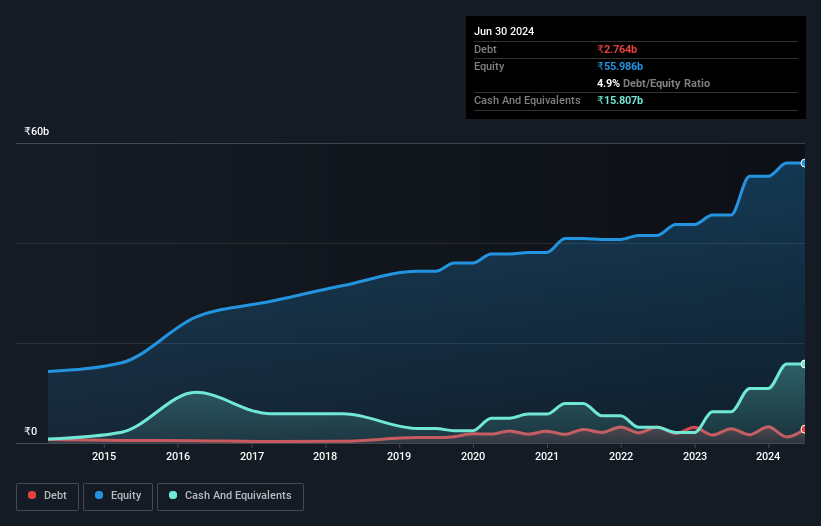Here's Why Kansai Nerolac Paints (NSE:KANSAINER) Can Manage Its Debt Responsibly

The external fund manager backed by Berkshire Hathaway's Charlie Munger, Li Lu, makes no bones about it when he says 'The biggest investment risk is not the volatility of prices, but whether you will suffer a permanent loss of capital.' It's only natural to consider a company's balance sheet when you examine how risky it is, since debt is often involved when a business collapses. We note that Kansai Nerolac Paints Limited (NSE:KANSAINER) does have debt on its balance sheet. But the more important question is: how much risk is that debt creating?
When Is Debt A Problem?
Debt assists a business until the business has trouble paying it off, either with new capital or with free cash flow. Ultimately, if the company can't fulfill its legal obligations to repay debt, shareholders could walk away with nothing. However, a more common (but still painful) scenario is that it has to raise new equity capital at a low price, thus permanently diluting shareholders. Of course, plenty of companies use debt to fund growth, without any negative consequences. The first thing to do when considering how much debt a business uses is to look at its cash and debt together.
View our latest analysis for Kansai Nerolac Paints
How Much Debt Does Kansai Nerolac Paints Carry?
The chart below, which you can click on for greater detail, shows that Kansai Nerolac Paints had ₹2.76b in debt in March 2024; about the same as the year before. But it also has ₹15.8b in cash to offset that, meaning it has ₹13.0b net cash.

How Healthy Is Kansai Nerolac Paints' Balance Sheet?
We can see from the most recent balance sheet that Kansai Nerolac Paints had liabilities of ₹15.2b falling due within a year, and liabilities of ₹2.91b due beyond that. Offsetting these obligations, it had cash of ₹15.8b as well as receivables valued at ₹13.4b due within 12 months. So it can boast ₹11.1b more liquid assets than total liabilities.
This short term liquidity is a sign that Kansai Nerolac Paints could probably pay off its debt with ease, as its balance sheet is far from stretched. Simply put, the fact that Kansai Nerolac Paints has more cash than debt is arguably a good indication that it can manage its debt safely.
Also good is that Kansai Nerolac Paints grew its EBIT at 17% over the last year, further increasing its ability to manage debt. When analysing debt levels, the balance sheet is the obvious place to start. But it is future earnings, more than anything, that will determine Kansai Nerolac Paints's ability to maintain a healthy balance sheet going forward. So if you want to see what the professionals think, you might find this free report on analyst profit forecasts to be interesting.
Finally, a company can only pay off debt with cold hard cash, not accounting profits. Kansai Nerolac Paints may have net cash on the balance sheet, but it is still interesting to look at how well the business converts its earnings before interest and tax (EBIT) to free cash flow, because that will influence both its need for, and its capacity to manage debt. In the last three years, Kansai Nerolac Paints's free cash flow amounted to 44% of its EBIT, less than we'd expect. That's not great, when it comes to paying down debt.
Summing Up
While it is always sensible to investigate a company's debt, in this case Kansai Nerolac Paints has ₹13.0b in net cash and a decent-looking balance sheet. And we liked the look of last year's 17% year-on-year EBIT growth. So we don't think Kansai Nerolac Paints's use of debt is risky. When analysing debt levels, the balance sheet is the obvious place to start. But ultimately, every company can contain risks that exist outside of the balance sheet. These risks can be hard to spot. Every company has them, and we've spotted 2 warning signs for Kansai Nerolac Paints you should know about.
Of course, if you're the type of investor who prefers buying stocks without the burden of debt, then don't hesitate to discover our exclusive list of net cash growth stocks, today.
Valuation is complex, but we're here to simplify it.
Discover if Kansai Nerolac Paints might be undervalued or overvalued with our detailed analysis, featuring fair value estimates, potential risks, dividends, insider trades, and its financial condition.
Access Free AnalysisHave feedback on this article? Concerned about the content? Get in touch with us directly. Alternatively, email editorial-team (at) simplywallst.com.
This article by Simply Wall St is general in nature. We provide commentary based on historical data and analyst forecasts only using an unbiased methodology and our articles are not intended to be financial advice. It does not constitute a recommendation to buy or sell any stock, and does not take account of your objectives, or your financial situation. We aim to bring you long-term focused analysis driven by fundamental data. Note that our analysis may not factor in the latest price-sensitive company announcements or qualitative material. Simply Wall St has no position in any stocks mentioned.
About NSEI:KANSAINER
Kansai Nerolac Paints
Manufactures and supplies paints and varnishes, enamels, and lacquers in India.
Excellent balance sheet average dividend payer.
Similar Companies
Market Insights
Community Narratives



